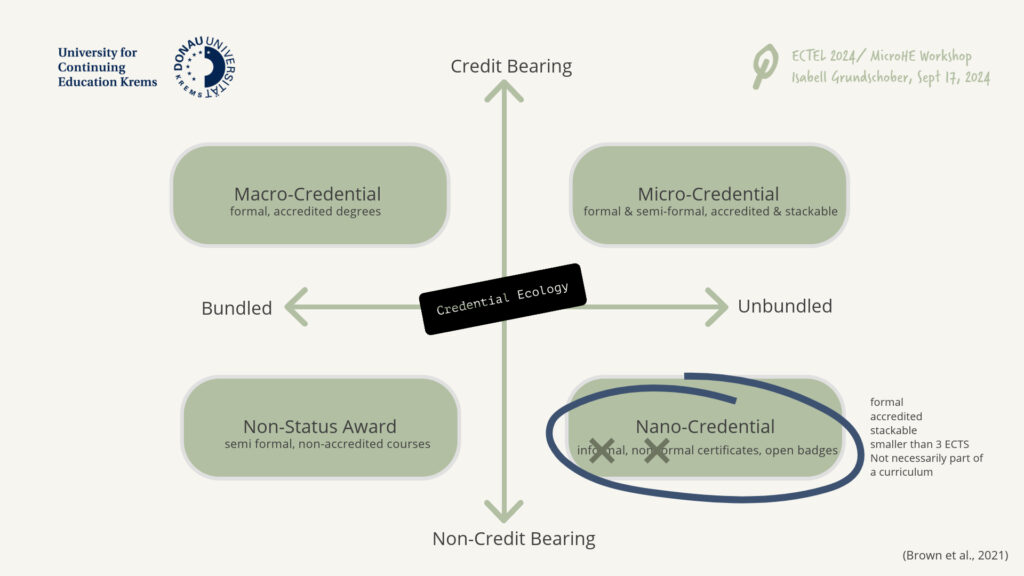The Power of Nano-Credentials for Learning and Employability
In a rapidly evolving world of work, where skills are constantly being redefined, traditional methods of professional development are no longer sufficient. As businesses strive to remain competitive, the need for continuous learning is more urgent than ever. Enter nano-credentials, a transformative force in both corporate learning and higher education, offering bite-sized, targeted learning experiences that are quickly becoming indispensable for upskilling today’s workforce.
I recently had the opportunity to present at the MicroHE Workshop during the ECTEL 2024 conference, where industry professionals, educators, and thought leaders gathered to discuss the implications of micro- and nano-credentials in education and the workplace. This innovative approach to learning was a key focus of the event, and it’s clear that nano-credentials are poised to revolutionize corporate learning and employability.
What Are Nano-Credentials?

In essence, nano-credentials represent the smallest unit of learning, often focused on a specific skill or experience. As Utah State University describes: “Open Badges and nano-credentials represent the smallest chunk of learning—often just a single experience or skill—whereas micro-credentials represent larger chunks of learning that do not quite ascend to the level of a full certificate.” These compact learning modules offer a fast and flexible way for professionals to gain specific skills relevant to their roles, making them especially valuable in fast-moving industries where adaptability is key.
Nano-credentials are part of a broader trend toward flexible, modular learning, and they offer something that traditional degrees can’t: immediacy. Rather than committing to a long-term program, employees can focus on acquiring the precise skills they need in real-time, responding to shifts in technology, regulations, or market demands. Usually, nano-credentials can be informal or non-formal, but in my presentation, I supported the idea of formally validating nano-credentials and gave examples of how to do that.
Key Insights from the MicroHE Workshop on Nano-Credentials: A Collaborative Brainstorming Session
During my presentation at ECTEL 2024, we hosted a collaborative brainstorming session with participants, exploring the potential of nano-credentials and their application in both education and the workplace. Here are the three most significant takeaways from our discussion:
- A Gateway to Learning Pathways for Corporate Upskilling
Nano-credentials act as an entry point into larger learning pathways. For working professionals, they provide a flexible and manageable approach to upskilling without requiring the time or financial investment of traditional degrees. This translates to a more agile workforce in corporate environments, where employees can develop relevant skills on demand, improving productivity and innovation. It also could be an entry point or also first touchpoint with higher education, without the necessity to enroll as a student. - Milestone-Based Learning for Busy Professionals
Unlike traditional education models that focus on extensive coursework, nano-credentials embrace a milestone-based learning approach. Employees achieve tangible, bite-sized goals that contribute to their broader career development. This modular system is ideal for full-time professionals who may find it difficult to balance work, life, and study commitments. Employers benefit too: they can identify and reward skills acquisition in real-time, fostering a culture of continuous improvement. - Immediate Impact on Employability and Career Advancement
Nano-credentials offer immediate benefits for professionals looking to enhance their employability. As these credentials often focus on specific, in-demand skills, they allow individuals to quickly fill gaps in their expertise, making them more competitive in the job market. Employers, in turn, can identify and recruit candidates with the precise skills needed for evolving roles, helping them remain competitive in dynamic industries like tech, healthcare, and finance.
Why Nano-Credentials Matter for Corporate Learning
Nano-credentials are reshaping how organizations approach employee development. In an age where innovation is constant, companies need to invest in training that keeps up with the pace of change. Nano-credentials offer several distinct advantages:
- Flexibility: Employees can earn credentials without stepping away from their jobs for extended periods. This is crucial in industries like IT, where even short periods away from the workforce can leave skills outdated.
- Relevance: Nano-credentials are hyper-focused on specific competencies, allowing professionals to quickly address skills gaps in their existing roles.
- Stackability: Unlike one-off training sessions, nano-credentials are often stackable. Employees can accumulate these credentials over time, building towards larger qualifications or certifications as their career progresses.
One example I shared at the workshop was how nano-credentials are already used to bridge gaps between higher education and the private sector. In Austria, for example, validation processes could ensure that these small-scale qualifications are recognized across industries and educational systems, giving them weight and credibility. Companies looking to invest in employee development benefit from this validation, as it ensures that the skills being taught meet industry standards.
The Future of Employability: A Competitive Edge
For employers, nano-credentials offer a strategic advantage in workforce development. Educational providers and businesses can tailor learning experiences to the exact needs of the learners. This is particularly useful in fast-changing industries, where outdated knowledge can quickly become a liability. Nano-credentials offer the solution: targeted, up-to-date learning that directly contributes to business goals as well as societal challenges.
For employees, the impact on employability is profound. Nano-credentials provide proof of expertise in specific areas that are immediately relevant to their field. This transparency and precision in skills acquisition gives workers a competitive edge, whether they are looking to advance within their current company or seeking new opportunities elsewhere. For industries that require constant upskilling—such as technology, healthcare, and finance—nano-credentials are quickly becoming a must-have.
Next Nano-Credential Experimentation
On the 14th of November 2024, we pilot a nano-credential course for people working in Medicine/Health: “Transforming Medicine With AI”. Participants can earn 1 ECTS point at the University of Continuing Education Krems.
We also pilot a hyflex delivery format, to answer the needs of working professionals, who have little time for continuing education and need to fit it into a busy schedule.
If you want to join, register until the 5th of November 2024!
Closing Thoughts: The Nano-Credential Revolution
Nano-credentials are more than just a trend—they are a transformative force in how we approach learning and development in the modern workplace and education in general. At the ECTEL 2024 MicroHE Workshop, it became clear that these small but powerful credentials are shaping the future of education and employability.
By offering a flexible, stackable, and targeted approach to skills development, nano-credentials meet the demands of today’s fast-paced corporate environment. Employers who embrace this model will be well-positioned to cultivate a workforce that is both adaptive and capable of meeting the challenges of tomorrow.
Interested in exploring how nano-credentials can benefit your organization? Let’s connect and discuss how these learning tools can transform your workforce strategy.
Literature and Sources
- Presentation slides “Nano-Credentials in Continuing Education of HE Lecturers: Building Bridges between HigherEd & VET”
- G., Beirne, E., & Lochlainn, C. M. (2021). The Global Micro-credential Landscape: Charting a New Credential Ecology for Lifelong Learning. Journal of Learning for Development, 8(2), Article 2. https://doi.org/10.56059/jl4d.v8i2.525
- Bundesgesetz über die höhere berufliche Bildung, BGBl. I (2024). https://www.ris.bka.gv.at/GeltendeFassung.wxe?Abfrage=Bundesnormen&Gesetzesnummer=20012540
- Bundesgesetz über die Organisation der Universitäten und ihre Studien, BGBl. I § 78 (2024). https://www.ris.bka.gv.at/GeltendeFassung.wxe?Abfrage=Bundesnormen&Gesetzesnummer=20002128
- Zou, H., Ullah, A., Qazi, Z., Naeem, A., & Rehan, S. (2023). Impact of micro-credential learning on students’ perceived employability: The mediating role of human capital. International Journal of Educational Management, 38(4), 897–915. https://doi.org/10.1108/IJEM-01-2023-0002
